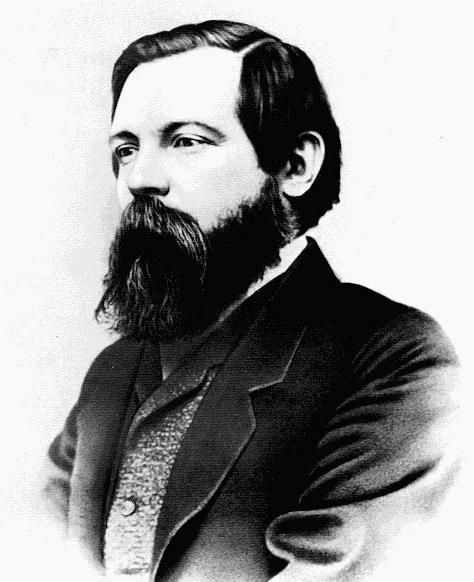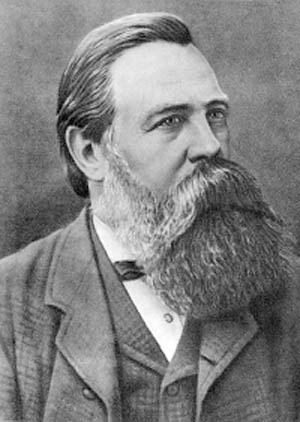<Back to Index>
- Philosopher Friedrich Engels, 1820
- Composer Anton Grigorevich Rubinstein, 1829
- Prime Minister of France Achille Léonce Victor Charles, 3rd duc de Broglie, 1785
PAGE SPONSOR


Friedrich Engels (28 November 1820 – 5 August 1895) was a German social scientist, author, political theorist, philosopher, and father of communist theory, alongside Karl Marx. Together they produced The Communist Manifesto in 1848. Engels also edited the second and third volumes of Das Kapital after Marx's death.
Friedrich Engels was born in Barmen, Rhine Province of the kingdom of Prussia (now part of Wuppertal in North Rhine-Westphalia, Germany) as the elder son of a German textile manufacturer, with whom he had a strained relationship. Due to family circumstances, Engels dropped out of high school and was sent to work as a nonsalaried office clerk at a commercial house in Bremen in 1838.
During this time, Engels began reading the philosophy of Hegel, whose teachings had dominated German philosophy at the time. In September 1838, he published his first work, a poem titled The Bedouin, in the Bremisches Conversationsblatt No. 40. He also engaged in other literary and journalistic work.
In 1841, Engels joined the Prussian Army as
a member of the Household Artillery. This position moved him to Berlin
where he attended university lectures, began to associate with groups
of Young Hegelians and published several articles in the Rheinische Zeitung. Throughout his lifetime, Engels would point out that he was indebted to German philosophy because of its effect on his intellectual development. In 1842, the 22-year-old Engels was sent to Manchester, Britain, to work for the textile firm of Ermen and Engels in which his father was a shareholder. Engels'
father thought that working at the Manchester firm might make Engels
reconsider the radical leanings that he had developed in high school. On his way to Manchester, Engels visited the office of the Rheinische Zeitung and met Karl Marx for the first time - though they did not impress each other. In Manchester, Engels met Mary Burns, a young woman with whom he began a relationship that lasted until her death in 1862. Mary
acted as a guide through Manchester and helped introduce Engels to the
English working class. The two maintained a lifelong relationship; they
never married, as Engels was against the institution of marriage which
he saw as unnatural and unjust. During
his time in Manchester, Engels took notes of the horrors he personally
observed there, notably child labor, the despoiled environment and
overworked and impoverished laborers. These
notes and observations, along with his experience working in his
father's commercial firm, formed the basis for his views on the "grim
future of capitalism and the industrial age", outlined in his first book The Condition of the Working Class in England in 1844. While
writing it, Engels continued his involvement with radical journalism
and politics. He frequented some areas also frequented by some members
of the English labour and Chartist movements, whom he met, and wrote for several journals, including The Northern Star, Robert Owen’s New Moral World and the Democratic Review newspaper. After a productive stay in Britain, Engels decided to return to Germany in 1844. On his way, he stopped in Paris to meet Karl Marx, with whom he had an earlier correspondence. Marx and Engels met at the
Café de la Régence on the Place du Palais, 28 August
1844. The two became close friends and would remain so for their entire lives. Engels ended up staying in Paris to help Marx write The Holy Family, which was an attack on the Young Hegelians and the Bauer brothers. Engels' earliest contribution to Marx's work was writing to the Deutsch-französische Jahrbücher journal, which was edited by both Marx and Arnold Ruge in Paris in the same year.
From 1845 to 1848, Engels and Marx lived in Brussels, spending much of their time organizing the city's German workers. Shortly after their arrival, they contacted and joined the underground German Communist League and were commissioned by the League to write a pamphlet explaining the principles of communism. This became The Manifesto of the Communist Party, better known as the Communist Manifesto. It was first published on 21 February 1848. During February 1848, there was a revolution in France that
eventually spread to other Western European countries. This event
caused Engels & Marx to go back to their home country of Prussia, specifically the city of Cologne. While living in Cologne, they created and served as editors for a new daily newspaper called the Neue Rheinische Zeitung. However, during the June 1849 Prussian coup d'état the newspaper was suppressed. After the coup, Marx lost his Prussian citizenship,
was deported, and fled to Paris and then London. Engels stayed in
Prussia and took part in an armed uprising in South Germany as an aide-de-camp in the volunteer corps of August Willich. When the uprising was crushed, Engels managed to escape by traveling through Switzerland as a refugee and returned to England. Once
Engels made it to Britain, he decided to re-enter the commercial firm
where his father held shares in order to help support Marx. He hated
this work intensely but knew that his friend needed the support. He
started off as an office clerk, the same position he held in his teens,
but eventually worked his way up to become a partner in 1864. Five
years later, Engels retired from the business to focus more on his
studies. At
this time, Marx was living in London but they were able to exchange
ideas through daily correspondence. In 1870, Engels moved to London
where he and Marx lived until Marx's death in 1883. His London home at this time and until his death was 122 Regent's Park Road, Primrose Hill, NW1. Marx's first London residence was a cramped apartment at 28 Dean Street, Soho. From 1856, he lived at 9 Grafton Terrace, Kentish Town, and then in a tenement at 41 Maitland Park Road from 1875 until his death. After Marx's death, Engels devoted much of his remaining years to editing Marx's unfinished volumes of Capital. However, he also contributed significantly to other areas. Engels made an argument using anthropological evidence of the time to show that family structures have changed over history, and that the concept of monogamous marriage
came from the necessity within class society for men to control women
to ensure their own children would inherit their property. He argued a
future communist society would allow people to make decisions about
their relationships free from economic constraints. One of the best
examples of Engels' thoughts on these issues are in his work The Origin of the Family, Private Property and the State. Engels died of throat cancer in London in 1895. Following cremation at Brookwood Cemetery near Woking, his ashes were scattered off Beachy Head, near Eastbourne as he had requested. Engels
is commonly known as a "ruthless party tactician", "brutal ideologue",
and "master tactician" when it came to purging rivals in political
organizations. However, another strand of Engels’s personality was one
of a "gregarious", "bighearted", and "jovial man of outsize appetites",
who was referred to by his son-in-law as "the great beheader of champagne bottles." His interests included poetry, fox hunting, and he hosted regular Sunday parties for London’s left-wing intelligentsia where
as one regular put it, "no one left before 2 or 3 in the morning." His
stated personal motto was "take it easy", while "jollity" was listed as
his favorite virtue. Tristram Hunt, author of Marx’s General: The Revolutionary Life of Friedrich Engels, sums up the disconnect between Engel's personality, and those Soviets who later utilized his works, stating: